By Uma Purkayastha
 Shillong started its urban journey as the capital of the newly-formed Assam province in 1874. Though a capital by name, it was not properly equipped with city-like amenities. The newly-carved gravel roads of the hill resort were bumpy and not motorable. The only means of local communication was the bullock or pony cart known as the tanga service.
Shillong started its urban journey as the capital of the newly-formed Assam province in 1874. Though a capital by name, it was not properly equipped with city-like amenities. The newly-carved gravel roads of the hill resort were bumpy and not motorable. The only means of local communication was the bullock or pony cart known as the tanga service.
In those days, British officers also had to use the tanga service for transportation and local communication. In April 1901, Swami Vivekananda came to Shillong from Guwahati in a pony cart. The trip, with intervals, took him almost three days. He went back after a month in the same mode of transportation.
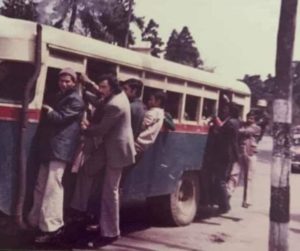 In course of time, the Shillong-Guwahati Road was metalled for bus service to start in 1906. The roads in Shillong were gradually paved, although some sported asphalt partially. A countable few private cars owned by the British officers and some aristocrat natives used these roads. Most people were pedestrians.
In course of time, the Shillong-Guwahati Road was metalled for bus service to start in 1906. The roads in Shillong were gradually paved, although some sported asphalt partially. A countable few private cars owned by the British officers and some aristocrat natives used these roads. Most people were pedestrians.
The local taxi service in Shillong started in 1938 and the first cab belonged to Dharneswar Mazumdar (Ref: ‘A Dream Meeting’ by Kalpana Gupta, former reporter of Ananda Bazar Patrika).
The city bus service as a local conveyance in Shillong started in the mid-1940s, senior citizens said. The fare was 1 anna for every mile travelled. When the paise or decimal system was introduced in 1957, the bus fare changed to 12 paisa from point to point such as Laban to Police Bazar or Laban to Bara Bazar. A good number of people started travelling by city bus, but the students and office-goers preferred walking to their destinations. Only a few cabs offered local trips with the minimum fare of Rs 2 from Laban to Police Bazar for the whole taxi. The taxi drivers then were very gentle and well-behaved. I can recollect some of the dignified cabbies of the late 1960s with respect.
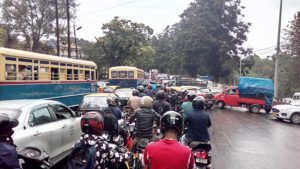 The number of cabs in the city increased gradually. Office-goers in a hurry would collectively hire a taxi, paying 25 or 50 paise each. A city bus would generally run at intervals of 30 minutes on most routes, which made people opt for taxis during emergencies.
The number of cabs in the city increased gradually. Office-goers in a hurry would collectively hire a taxi, paying 25 or 50 paise each. A city bus would generally run at intervals of 30 minutes on most routes, which made people opt for taxis during emergencies.
Till 1975, private cars were countable in Shillong. All the high-ranking government officers or MLAs were not entitled to an official vehicle for their personal use. Some physicians had their own cars to attend to the patients faster, but it was not affordable for all. So, the traffic in the city was manageable; there was no congestion on the roads like we see today. The general people could walk freely and safely deep into the night. Students could reach school on time without facing any traffic problems. Road accidents were rare.
The population of Shillong started increasing rapidly in the late 1970s and so did the number of local taxis. Young, unpolished cab drivers or city bus conductors would sometimes misbehave with the passengers and create unpleasant situations. They would not even spare dignified, elderly women. If anyone grumbled because of slow or rough driving, a conductor would pass comments such as: “Itne phutani tob bus may kiu? Helicopter se jao…”
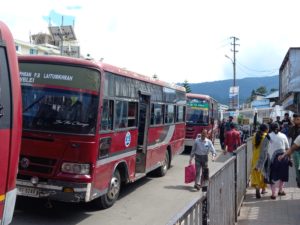 But there were many public transport operators who were gentle and well-behaved.
But there were many public transport operators who were gentle and well-behaved.
One of my worst experiences with a cabbie was in July 1980. I was returning home from the Government Girls’ HS School at Jail Road with six bundles of answer scripts of the half-yearly examination. I was waiting anxiously for a taxi as it was raining heavily and only a ‘full reservation’ taxi would take me home to Bishnupur. The taxi driver, hardly in his 20s, demanded Rs. 50, a very good amount at that time. I agreed reluctantly, mainly because of the important exam scripts. When the taxi reached IGP Point, some people with luggage waved for it to stop. The taxi stopped and the driver talked to them in a language I failed to understand. Without any hesitation, he accommodated six men in the taxi, completely ignoring my existence. They were pushing me ungently, pressing me against the door. The windows were rolled up because of the rain, and I felt very suffocated. The wet clothes and umbrellas of my co-passengers were damaging the exam papers. I remained patient helplessly.
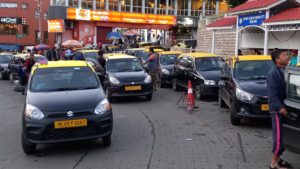 To my utter surprise, the driver asked me to get down at Garrison Point because he would proceed towards Mawprem with the passengers. I strongly protested as I had reserved the taxi first, and I insisted on being dropped at my destination first. The driver was adamant and said his taxi would run according to his sweet will. He came out of the taxi, opened the door and almost ordered me to get down without fail. He was murmuring: “Why should I miss earning more from the other passengers?”
To my utter surprise, the driver asked me to get down at Garrison Point because he would proceed towards Mawprem with the passengers. I strongly protested as I had reserved the taxi first, and I insisted on being dropped at my destination first. The driver was adamant and said his taxi would run according to his sweet will. He came out of the taxi, opened the door and almost ordered me to get down without fail. He was murmuring: “Why should I miss earning more from the other passengers?”
He demanded the fare from me. I paid him Rs 25 as he had brought me half the distance but he rudely demanded the full amount fixed at the time of hiring. The other passengers in the taxi were like dumb dolls. None of them uttered a single word in my favour. I paid the driver the full amount and said, “I shall complain.” He dared me to do so, laughed in a sinister way and left with the passengers.
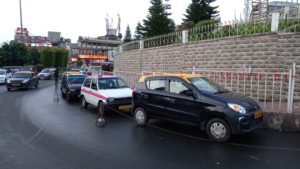 It was still raining heavily and no taxi was available. I was overburdened with the big bundles of exam papers and an umbrella struggling to save them from getting wetter. I managed to reach home after a long wait. I felt so humiliated that I lodged a complaint at the main police station against the driver.
It was still raining heavily and no taxi was available. I was overburdened with the big bundles of exam papers and an umbrella struggling to save them from getting wetter. I managed to reach home after a long wait. I felt so humiliated that I lodged a complaint at the main police station against the driver.
The next morning, I went to school as usual. Suddenly, a police officer came to me enquiring about the FIR I had registered. I told him the story in detail. He left and returned within an hour with the culprit for identification. I recognised him instantly. The police officer said he would be punished and his license would be seized for good. The driver fell down on my feet and begged for forgiveness with tears in his eyes. He promised never to do with any passenger what he did with me.
There are some good experiences too.
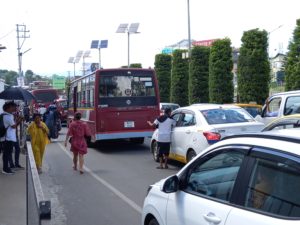 Shillong went through a critical phase in 1992. There would be a curfew every now and then to maintain peace and order in the city. Schools and colleges were closed for an indefinite period. But as the principal of a school, I had to attend the office regularly. One day, curfew was suddenly clamped at 4 pm while I was busy in the office. I was in a fix. There was no surety of the curfew being relaxed and we did not have a telephone in school. The office staff and I were worried about how to go home. We had no alternative to waiting helplessly for the curfew to be relaxed. It was for two hours from 5:30 pm. I rushed out to go home but there was no taxi around. I walked towards the main road at Police Bazar. It was almost dusk and getting darker. Fortunately, I spotted a taxi parked in front of the Transport office. The driver was a middle-aged man. I approached him and earnestly requested him to Bishnupur. He looked at me for some time and gestured for me to be seated in the taxi. I heaved a sigh of relief as I sat, the faces of my children flashing across my eyes. It had not been long since they lost their father.
Shillong went through a critical phase in 1992. There would be a curfew every now and then to maintain peace and order in the city. Schools and colleges were closed for an indefinite period. But as the principal of a school, I had to attend the office regularly. One day, curfew was suddenly clamped at 4 pm while I was busy in the office. I was in a fix. There was no surety of the curfew being relaxed and we did not have a telephone in school. The office staff and I were worried about how to go home. We had no alternative to waiting helplessly for the curfew to be relaxed. It was for two hours from 5:30 pm. I rushed out to go home but there was no taxi around. I walked towards the main road at Police Bazar. It was almost dusk and getting darker. Fortunately, I spotted a taxi parked in front of the Transport office. The driver was a middle-aged man. I approached him and earnestly requested him to Bishnupur. He looked at me for some time and gestured for me to be seated in the taxi. I heaved a sigh of relief as I sat, the faces of my children flashing across my eyes. It had not been long since they lost their father.
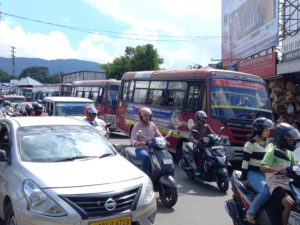 The cabbie did not utter a word to me as he drove full throttle. I was startled when he took a turn towards GS Road. The road from Jail Road to Laban was open for all vehicles in 1992. The silence of the driver had already made me nervous and the wrong turn he took rattled me. I screamed and asked the driver why he was going in the wrong direction. The driver turned his face towards me angrily and asked me to keep quiet with a movement of his finger. I got frightened and was sweating and trembling. The taxi took another turn at Butcher Road, crossing Sani Mandir. The entire G.S Road stretch was dark and deserted. Butcher Road was very dreadful during 1992. There was no streetlight, no residential quarters as today. A dense forest flanked the road, which was notorious for several incidents. The driver was looking back again and again, and I felt as if he was looking at me. I was wearing a gold chain and a pair of gold bangles. I shivered at the thought of being murdered, my ornaments snatched. I could even visualise the news of my unnatural death in the newspapers. I tried to shout but my throat was dry. I began praying to God. Moments later, I saw a ray of light; it was Rhino Point. I had almost reached my destination. Tears were rolling down my cheeks. I wiped them in relief as I reached home.
The cabbie did not utter a word to me as he drove full throttle. I was startled when he took a turn towards GS Road. The road from Jail Road to Laban was open for all vehicles in 1992. The silence of the driver had already made me nervous and the wrong turn he took rattled me. I screamed and asked the driver why he was going in the wrong direction. The driver turned his face towards me angrily and asked me to keep quiet with a movement of his finger. I got frightened and was sweating and trembling. The taxi took another turn at Butcher Road, crossing Sani Mandir. The entire G.S Road stretch was dark and deserted. Butcher Road was very dreadful during 1992. There was no streetlight, no residential quarters as today. A dense forest flanked the road, which was notorious for several incidents. The driver was looking back again and again, and I felt as if he was looking at me. I was wearing a gold chain and a pair of gold bangles. I shivered at the thought of being murdered, my ornaments snatched. I could even visualise the news of my unnatural death in the newspapers. I tried to shout but my throat was dry. I began praying to God. Moments later, I saw a ray of light; it was Rhino Point. I had almost reached my destination. Tears were rolling down my cheeks. I wiped them in relief as I reached home.
The driver opened his mouth then. “Madam, you don’t know how much risk I had to take to bring you here. Every moment I was scared that miscreants were following me. I rudely stopped you from talking so that nobody would hear your voice, which could invite danger. Please excuse me for my rudeness. I am relieved that you are home safely,” he said.
I was so touched that I caught his hands and burst into tears. He consoled me! I offered him Rs 100 but he took only Rs 20 as the due fare. I insisted on paying Rs 80 more but he declined. I could never forget the man who seemed like Satan but turned out to be God. Cabbies and other public transport operators like him keep Shillong shining and keep faith in humanity.



